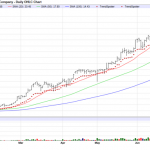Bill Ackman Q3 letter stay tuned for analysis – below are excerpts on Valeant, Fannie Mae, Freddie Mac and Herbalife
……………..
Valeant (VRX)
Valeant’s stock price declined significantly in the quarter as a result of statements by politicians regarding drug price increases, subpoenas from regulators, attacks by short sellers, and the termination of Valeant’s relationship with Philidor, a specialty pharmacy distribution channel used for dermatology products. On October 30, 2015, we held an investor conference call to answer the many questions we received about our investment in Valeant.
Approximately six weeks ago, Valeant’s board formed an ad hoc committee to investigate the recent allegations made against Philidor, including claims that Valeant management was involved in the alleged wrongdoing at Philidor. The committee has hired former U.S. Deputy Attorney General and Kirkland & Ellis partner Mark Filip to lead the investigation.
Valeant will hold an in-person, half-day investor meeting tomorrow, Wednesday, December 16th, to provide updated financial guidance for 2016, review the company’s strategy, and answer investor questions. We believe that this is an important step for Valeant to restore investor confidence.
On November 23rd, we filed a 13D reflecting our increased stake in Valeant. Before we increased our position, we did substantial due diligence by re-underwriting our investment in the company. In particular, we reviewed all of the short sellers’ allegations, the potential political and regulatory risks, the impact of the shutdown of Philidor, and the company’s capital structure, debt covenants, and overall financial risk. We updated our financial model in light of recent business developments in order to better assess free cash flows, how quickly the company would be able to reduce leverage, the probability of financial distress, and to determine a conservative estimate of Valeant’s intrinsic value.
Ultimately, we concluded that the risk of bankruptcy or financial distress was de minimis in light of (1) the highly cash-flow-generative nature of the business, (2) the minimal debt maturities over the next several years, (3) the nature of Valeant’s financial covenants, and the highly diversified (both by therapeutic area and geography) product portfolio. Because Valeant owns a highly diversified, divisible, and desirable portfolio of products that can be soldproduct-by- product and/or division-by-division in an industry with many well-capitalizedbuyers, it could deleverage at an even more rapid rate if it chose to do so. Once we determined that the risk of financial default was extremely small and the stock was trading at an enormous discount to intrinsic value, we considered various approaches to increasing our investment.
Generally, we purchase stocks outright to get exposure to a particular investment. In this case, we took advantage of the high volatility of Valeant stock, its extremely low share price, and the high degree of market uncertainty in choosing to build a position that offered us a compelling reward for the potential risk. Rather than purchase common stock outright, we increased our investment through a contemporaneous series of over-the-counter option transactions. The bulk of the increase in our investment in Valeant was created through the sale of European-style put options struck at a $60 stock price, the purchase of American-style call options at a $95 stock price, and the sale of European-style call options at $165 stock price, all of which expire in January 2017. This derivative position gives us the upside of the stock from $95 per share up to $165 per share until January 2017. The net purchase price of the options was $6.75.
In summary, if the stock rises to $165 or more by January 2017, we will make more than 10 times our net investment over this period. Our downside is equal to the net purchase price of each option plus the decline in the stock price, if any, below $60 per share as of January 2017. By selling European-style put options, the shares cannot be put to us until January of 2017. By then, we estimate that Valeant’s stock price will be substantially in excess of $60 per share, potentially several multiples of this price.












Leave A Comment